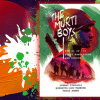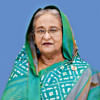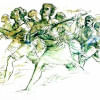Bangladesh Genocide of 1971: Time for the West to walk the talk

April 2022: Bucha, Ukraine
The whole world knows about the Bucha massacre of April 2022. There is photographic and video evidence from Western sources, including specific details of how many bodies were recovered, how many of them were children under the age of 18, how many people were killed by weapons and how many appeared to have died of natural causes related to the occupation. The scenes on the streets of Bucha were horrific and heartbreaking, to say the least, notwithstanding Russia's denial of it being authentic. The Western powers were quick to condemn President Vladimir Putin for the massacre, and some went further by terming it a genocide. The Western propaganda machines cried out in chorus condemning Russia.
But, for millions of Bangladeshis, the scene in Bucha in April 2022 took them back to May 1971.
May 1971: Chuknagar, Khulna, Bangladesh
On May 20, 1971, over a period of six hours between 11am and 5pm, at least 10,000 people (eye witnesses claim the number is much higher), were subjected to wanton killing at Chuknagar, a small township in Khulna district. People, mostly from the Hindu community, gathered at Chuknagar from Khulna and neighbouring districts to cross the border with India and escape targeted killings. Pakistani soldiers raided Chuknagar to carry out a brutal carnage. Bhadra, the small river flowing through Chuknagar, went red with the blood of the fallen. Most of the dead bodies found their "graves" on the river's bed.
The Chuknagar incident is only one of hundreds of such genocidal episodes that took place during the nine-month-long war of independence. But the world knows nothing about the Chuknagar genocide. And, on a larger scale, much about the Bangladesh Genocide of 1971. Why so? Unfortunately, the world is yet to be fair for all. It seems that such incidents must fit into the geopolitical, strategic or national security interests of the US and its allies in order to receive recognition. When such violence takes place in Europe or in the US, news of those immediately occupy the centre stage, while similar things happening in Asia, Africa or Latin America become simply peripheral, often to be ignored or even forgotten.
Geopolitical motivation outweighs humanitarian cause
Fifty-two years should create enough historical distance in terms of time and space for the UN, the US and its allies, and the community of nations at large to view dispassionately their respective roles when the Pakistani military was carrying out its brutal genocide in 1971, when three million people were killed, over 200,000 women were raped by Pakistan's military, more than 10 million people were forced to flee to India as refugees, and almost half of Bangladesh's population was internally displaced. It was never a lack of evidence, but biased, narrow and self-seeking political motivations that have thus far obstructed the recognition of the genocide. It was no other sources than the US Consulate in Dhaka that reported early in April 1971 to the State Department that what was happening in then East Pakistan was no less than a genocide, and "Our government has evidenced what many will consider moral bankruptcy" (The Blood Telegram, April 6, 1971). In June 1971, The Sunday Times published Anthony Mascarenhas' article titled "Genocide," which vividly exposed the scale of the genocidal carnage carried out by the Pakistan Army. The report shook the conscience of people around the world. There were also Simon Dring of The Daily Telegraph, Sydney Schanberg of The New York Times, and many others who demonstrated their journalistic as well as humanistic courage in informing the world about the genocidal savagery of the Pakistan Army.
There was also Joan Baez's "Song of Bangladesh," and George Harrison and friends' famous Concert for Bangladesh. Allen Ginsberg's poem "September on Jessore Road" gives a vivid, heart-wrenching description of the situation then which still reverberates through the hearts of millions:
"Millions of Souls nineteen seventy-one
homeless on Jessore road under grey sun
A million are dead, the million who can
Walk toward Calcutta from East Pakistan..."
But, alas! The denial sees no end. Nothing could penetrate the deaf ears of the US administration. Gary J Bass' book The Blood Telegram: Nixon, Kissinger and a Forgotten Genocide unravels facts behind President Richard Nixon and Foreign Secretary Henry Kissinger's stance as to how Bangladesh became "collateral damage" when they were pursuing back-channel diplomacy using General Yahya Khan, their friend, as a conduit to achieve a rapprochement between Washington and Beijing. Bass cited Kissinger's comments, in which he'd said that "a humanitarian concern is not necessarily an American concern." In the bipolar world of the 70s, was defending Pakistan at all costs so critical to the US geopolitical interests? Even at the cost of millions being murdered?
Of late, there is also some good news
In recent times, some internationally reputed organisations, such as Genocide Watch, Lemkin Institute for Genocide Prevention, International Coalition of Sites of Conscience, and International Association of Genocide Scholars made appeals to the UN and the international community to recognise the Bangladesh Genocide of 1971. While multi-disciplinary research contributes immensely, excuses for more evidence, for more scholarly research, are indeed getting narrower. The recent bipartisan resolution submitted by US Congressmen Steven Chabot and Ro Khanna to recognise Bangladesh genocide kindles some hope in our minds.
The National Parliament of Bangladesh passed a motion in 2017 to commemorate March 25 as Genocide Day. While the demands from the civil society, the government, and from relevant international organisations are getting louder, the Bangladesh Genocide issue has also been discussed in the last couple of years at side events of the International Human Rights Council sessions.
It's time for the West to walk the talk
The avowed Western values of freedom, democracy, human rights, and a rules-based world order appear quite hypocritical to non-Western audiences when they see the selective approach of Western powers when applying those values. It's time for the West to practise what they preach in an emerging world where unipolar moments seem to be a thing of the past. The same applies to the United Nations, which is still structured to enable Western dominance. Some serious measures to redress the past grievances of the Global South will significantly contribute to establishing the much-needed mutual trust and respect. There will be only winners in such a restructured engagement process.
Bangladesh, indeed, represents one of those serious cases of the past grievances. "I paid a price for my dissent. But I had no choice," Archer K Blood told The Washington Post in 1982. "The line between right and wrong was just too clear-cut."
We can reasonably hope, after 52 years, that the UN, the US, and other countries will see the line between right and wrong as being clear-cut like Blood had. Bangladesh, as a nation, and the families of millions of victims look forward to the day when the Bangladesh Genocide of 1971, one of the darkest chapters of human history, will receive international recognition.
Mrinal Sircar is a freedom fighter of the 1971 Liberation War of Bangladesh.
Views expressed in this article are the author's own.
Follow The Daily Star Opinion on Facebook for the latest opinions, commentaries and analyses by experts and professionals. To contribute your article or letter to The Daily Star Opinion, see our guidelines for submission.

 For all latest news, follow The Daily Star's Google News channel.
For all latest news, follow The Daily Star's Google News channel. 












Comments